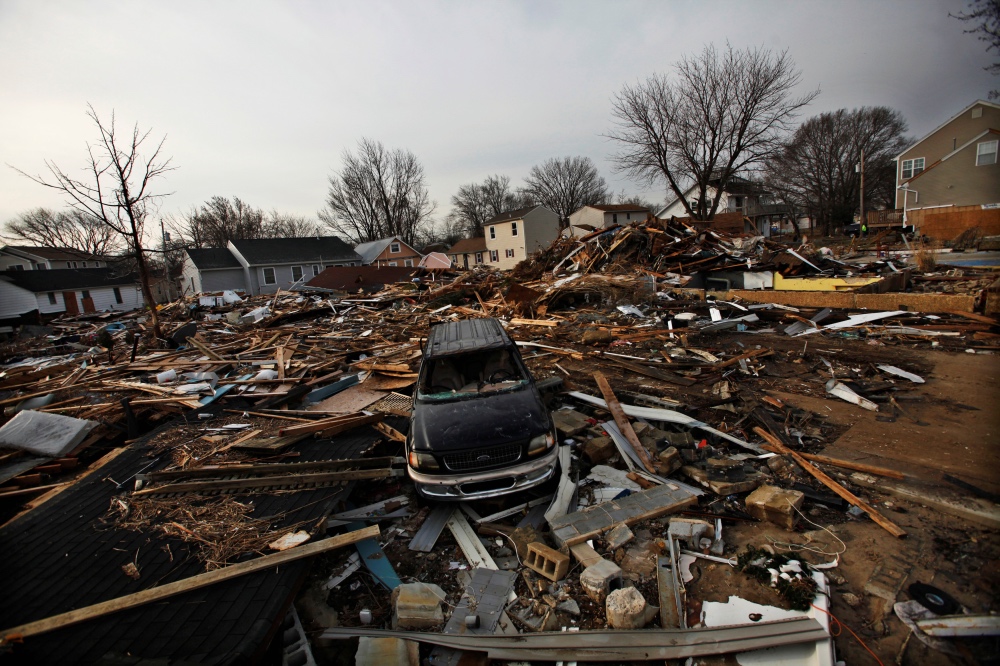Washington, DC
Thomson Reuters Foundation
Torch, radio, whistle – all standard fare in a storm survival kit. Now Americans at risk of hurricane damage are being urged to grab their house deeds and check they are valid, too.
Clear proof of ownership, legal experts say, is the key to unlocking vital government aid after a hurricane sweeps through – felling homes, stealing cars and ransacking whole communities.

A car and houses damaged by the storm surge of Hurricane Sandy, are seen one month after the disaster at Union Beach, New Jersey, on 29th November, 2012. PICTURE: Reuters/Eduardo Munoz.
With the first hurricane of the season already logged, they said people should act now and dig out their deeds to ensure they carry the right name and there are no conflicts looming.
“Rather than being reactive, this is something that can be controlled prior” to a storm, said Nancy Lugo, attorney coordinator with Bay Area Legal Services in Tampa, Florida.
Lugo’s office oversees a Florida programme that connects pro bono attorneys with home owners in 16 counties, helping locals get their paperwork in order before it is too late.
Statistics on conflicted titles are not available but experts say disputes are common in hurricane-prone areas.
In 2017, scholars from the University of Georgia estimated the problem afflicted 10 per cent to 15 per cent of land in the US south-east, typically in farming areas or “declining or distressed” cities.
Owning documents and ensuring they are in order should be just as basic as getting storm-ready, said Lugo.
“Have you checked the title to your home? This is the same as getting together water and non-perishable goods,” she said.
The hurricane season in the United States typically runs from June until November, with about 11 major storms a year, according to government data, and insured losses of more than $US500 billion in the past three decades.
Even before this season’s first Atlantic hurricane hit flood-prone southern Louisiana earlier this month, legal aid workers had spent the last few weeks going door to door to urge action.
Locals know to pack emergency supplies of food and water, get precious photos or keepsakes together, but many don’t realise they need to go through their filing cabinet, too.
Clear titles are typically required to access all federal, state and insurance assistance after a disaster, and problems can hit devastated residents hard, say lawyers, especially if land or a home passes through a family without a clear will.
“We are going out in the community more as hurricane season approaches” to discuss title issues, said Laura Tuggle, executive director of Southeast Louisiana Legal Services in New Orleans, a legal aid group.
The focus is on older widowed people, she told the Thomson Reuters Foundation, as they are most at risk of title problems.
From floods to storms, southern Louisiana has seen the same paperwork problem play out repeatedly.
Some 20,000 people could not get help after hurricanes in 2005, according to statistics cited in a federal report, and a crisis similarly followed the 2016 floods, said Tuggle, robbing more than 1,000 people of help, according to one estimate.
Since the problem first came to light in 2005, officials, banks and legal aid groups have begun to recognise the importance of title clearing, she said. “But I still don’t think the community has had this ‘Aha’ moment that they should add this to their hurricane preparation list.”
That is in part because getting documents in shape involves complex, emotional issues of family and death, and can cost a lot, too, she said, with a disproportionate need in poor communities.
Tuggle said a title-clearing programme in which her non-profit office took part had helped win clients about $US9 million in post-disaster assistance, tied to what is usually a family’s largest asset: its home.
Paul Servick of Baton Rouge, Louisiana, is one such client.
He inherited his father’s home but had no will or paperwork to prove it, so lacked all government help for more than a year after his house was heavily damaged in the 2016 floods.
Eventually, his lawyer was able to get a court to rule that he was indeed the legal owner – allowing him to “get all funds released to bring my home back whole,” Servick said in a video made available by Flood Proof, the non-profit initiative.
Tuggle has seen an “uptick” in requests for pre-storm help in recent weeks, a trend Jennifer Shuler, a government attorney in Florida, said was playing out in her state, too.
Shuler works in Panama City, hit by a major hurricane in October. Ever since, she has been “bombarded” with requests from residents for documents that can help prove home ownership.
“People have learned the hard way,” Shuler said.






